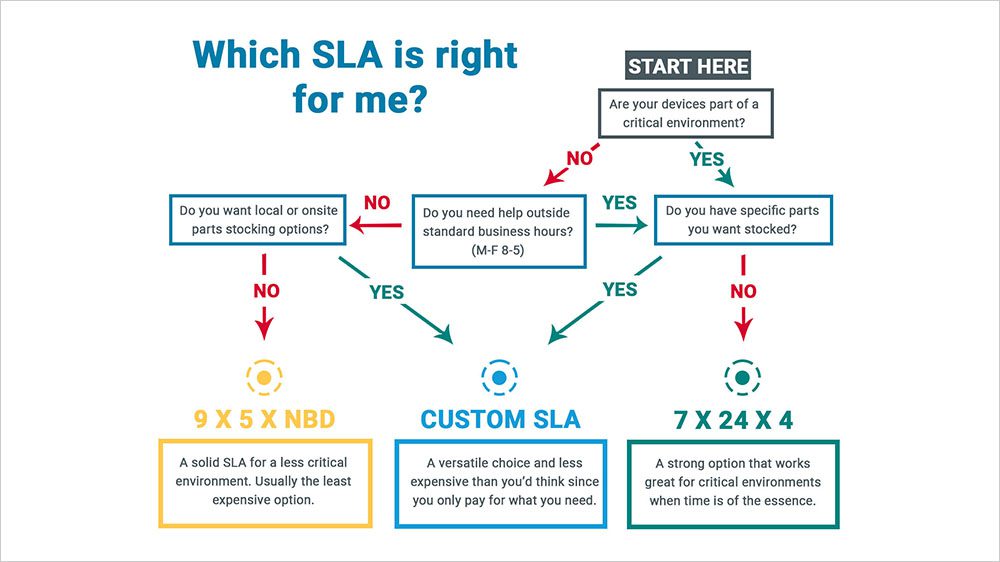Why C-levels Should Care About Aftermarket Hardware Support
Biggest Company, Lowest Quote — Not Always the Best Choices
Manufacturer Support vs Third Party Support
If you’re like a lot of C-levels or decision-making management, you simply don’t have time to shop around for the best hardware support. It checks a box, so you take the lowest quote or the biggest company/most recognizable brand assuming that it’s all the same anyway and you have more important things to think about. That is partially true — when comparing any aftermarket or third party maintenance (TPM) provider with OEM support, the benefits are going to stack up pretty evenly across the board. Less expensive, support for EOSL equipment, better service — you will find all those things with a TPM provider.
But what about when you are trying to decide between TPM providers?
Many times the person making the decisions about hardware support is not the same person who will be using it. Maybe the purchasing department handles this sort of thing, or maybe the IT manager will be gathering quotes and weighing in, but C-levels or management makes the final decision.
With so many demands on your time and attention, why should you care about the service you will receive with a hardware support contract?
Aftermarket Hardware Support Can Have Significant Budget Impacts
For many companies, recent events have led to an increased focus on budgets and spending. CapEx and OpEx budgets are shifted around as companies try to find solutions that fit their new normal. Aside from the obvious cost savings that come from switching from an OEM warranty to a third party maintenance contract, there are other ways that hardware support can impact your budget decisions.
For instance, if your company has an automatic hardware refresh policy that kicks in at the 3-year mark or when the OEM warranty expires, revisiting those policies can help you save a significant chunk of your CapEx budget. Like we talked about in our article about hardware refreshes, there are other options. Creating a solution that involves some variation of keeping the current functional hardware, replacing what is absolutely necessary, upgrading existing hardware with more memory or drives as needed, and putting it under a hardware support contract can transform the way you approach data center expenditures.
Quote Shopping for Third Party Hardware Support Services
“Fine. Aftermarket support sounds like it could be a good thing,” you might be thinking. You tell your IT staff or purchasing department, “Find the cheapest quote and check it off the list.” But wait. Just like in most industries, you get what you pay for. That doesn’t mean you shouldn’t look for a competitive quote for hardware support!
But in many support quotes, you might see a price you like, but you don’t really see what’s being offered. If important details haven’t been discussed (like parts stocking strategies or what the “4” means in a 7x24x4 SLA), you’ll likely find that your service isn’t what you expected.
Bad service can end up costing more in the long run. If the correct parts weren’t stocked or if field engineers don’t show up when they are supposed to, your next-day fix could turn into a week of downtime affecting the bottom line.
The good news about quote shopping for third party maintenance services is that if you have a certain budget you are trying to hit or need the price to be negotiated a little more, some companies (like M Global) will work with you on getting the price where it needs to be. We welcome feedback and questions in the quoting process.
Your IT Manager Will Thank You
Because the IT manager or system administrator is usually the one down in the trenches dealing with the problems, things can be pretty stressful for them when a failure occurs. All eyes are on them to get it fixed ASAP.
If they have no hardware support provider to back them up or subpar service from a company that doesn’t keep their promises as outlined in the contract, hours of downtime can turn into days, tempers can flare, and simple fixes can turn into major headaches.

SysAdmins Love the Way We Work
We’ve seen it happen many times, where a system administrator or IT staff come to us in a jam. We work with them on getting everything fixed. They are so impressed and surprised by the level of care they receive they send a proposal for a hardware contract up the chain of command only to have management refuse them because they don’t see the value of quality hardware support.
But supporting the IT department with a thorough hardware support contract can take some of the stress off their plate, freeing up time and resources. Stranger things have happened than a happy and relaxed IT manager.
The Quality Of Your Hardware Support Matters
"Measure twice, cut once."
Like the old adage says, a little extra time taken at the front end can save a lot of headaches and wasted resources. And that is true now more than ever. It might feel like a waste at the front end to spend time comparing hardware details of support quotes.
We get it — you’ve got a lot on your plate. Maybe that task can be delegated to someone else, like the IT manager or whoever will be using the support. We even welcome “test drives” of our service so that clients can get an idea of what it will be like to work with us.
Regardless of whether you end up with OEM support, a TPM contract, or no support at all, not evaluating your situation and weighing the important factors for your business in making this decision is like playing roulette with your data center. IT departments are one of those areas that when everything runs smoothly, no one notices. But when there is an issue, it can throw everything into disarray. Servers go down, and the whole company feels the effects. Data is lost or corrupted, and it can be a very big deal. Downtimes can be expensive and frustrating.
Obviously, we are going to recommend hardware support in most situations—not just because it’s what we do. We’ve seen some pretty hairy situations where companies have their backs against the walls because of data center issues that could have been either prevented or minimized with proper hardware support.
New Challenges = New Innovations
New challenges have come to the forefront recently, such as permanent growth of a remote workforce, increased demand for IT technology, supply chain issues, reduced budgets, and more. One of the benefits of new challenges is that it forces innovative thinking, and sometimes the solutions that come from those challenges can actually make things better than they were before. Smoother processes, fewer expenditures, relationships with new partners and vendors—all these things can be positive outcomes.
Developing solutions to address these new challenges can be well worth the time and resources required. At M Global, we support innovative thinking and are all about coming up with unique and customized solutions for our clients.
Let M Global Help
Contact us if you'd like to find out more about how we can help you get the most out of your hardware support. We're happy to assist you at any stage and will work with you to find the best option for your unique IT environment!

Author Note:
Written by Angie Stephens with contributions from M Global team members including SMEs, management executives, and more.
Get Started Now
We want you to consider us an extension of your team, a trusted resource and advisor. Call us today at 855-304-4600 to find out more.








